Introduction
He who knows no foreign languages knows nothing of his own.
 Our vision in the Modern Foreign Languages department is that all language learners develop the skills and confidence to consider themselves 'World Citizens' who belong in a multicultural, mutually respectful world. We aim to support students to understand other countries and cultures so that they can be more open and adaptable to new experiences; ensuring that each topic we study contains an element of cultural reference to not only the target language country, but the wider Hispanic or Francophone spheres.
Our vision in the Modern Foreign Languages department is that all language learners develop the skills and confidence to consider themselves 'World Citizens' who belong in a multicultural, mutually respectful world. We aim to support students to understand other countries and cultures so that they can be more open and adaptable to new experiences; ensuring that each topic we study contains an element of cultural reference to not only the target language country, but the wider Hispanic or Francophone spheres.
The department is committed to developing strong, lifelong linguistic skills and to encourage students to become curious and interested in the world. Our broad curriculum builds on the knowledge of language learning developed during the primary years and provides the challenge to further develop the skills necessary to become competent language communicators.
Ultimately, we want our students to have a love of languages and aim to achieve this by nurturing a linguistic curiosity and an intrinsic motivation to explore and respect other cultures and people. We endeavour to inspire all MFL practitioners/peers through collaboration, support and modelling exceptional practice - no matter what stage of career journey.
Staff
Ms M Reina - Head of Department
Ms Rubio - Assistant Head of department and ECT mentor
Mrs P Caygill - teacher of MFL and EAL Coordinator
Mrs J Cebro - teacher of MFL
Miss A Torres - teacher of MFL
Programme of Study KS4
Head of Department: Ms. M Reina
Contact email address: reinam@broughtonhall.com
Specification: Pearson Edexcel
Qualification: GCSE Spanish
 In today's increasingly interconnected and interdependent world, proficiency in other languages is a vital skill that gives you the opportunity to engage with the world in a more immediate and meaningful way while better preparing you to compete and succeed in the global economy.
In today's increasingly interconnected and interdependent world, proficiency in other languages is a vital skill that gives you the opportunity to engage with the world in a more immediate and meaningful way while better preparing you to compete and succeed in the global economy.
One of the most rewarding aspects of the human experience is our ability to connect with others. Being able to communicate with someone in his or her language is an incredible gift that will open up a world of amazing opportunities. Language skills can give you a competitive edge when applying for jobs and enables you to appreciate and understand cultures other than your own. Furthermore, people who speak more than one language have improved memory, problem-solving and critical-thinking skills, enhanced concentration, ability to multitask, and better listening skills.
Studying languages at key stage 4 at Broughton Hall brings a wealth of benefits that are undeniable.
How is the course structured & assessed?
Edexcel GCSE languages believe that languages should be accessible for all students. Our new Pearson Edexcel Level 1/Level 2 GCSE (9-1) in Spanish has been developed to help students of all abilities progress and develop a passion for languages, through culturally engaging content.
The New Pearson Edexcel Level 1/Level 2 GCSE (9-1) in Spanish consists of four externally examined papers based on the following skills: listening, speaking, reading and writing.
Built on a foundation of inclusivity, accessibility and transparency, we have created a qualification that takes a student-centred approach.
First teaching:
2024
First assessment:
2026
Combines real-world content with assessments that are transparent and accessible for all abilities
Includes vocabulary and thematic contexts which reflect and represent diverse student experiences
Language is more than words. Combining clear, concise and straightforward assessments with engaging, meaningful and relatable content, our new Pearson Edexcel Level 1/Level 2 GCSE (9-1) in Spanish is fit for the future, equipping students for life and careers in a global setting.
The vocabulary in this qualification enables students to communicate across a range of engaging and relatable thematic contexts, which are relevant to their current and future needs. Pearson asked students and teachers about the subjects that were meaningful and interesting to them, and selected the following six broad thematic contexts to provide a focus for the teaching and learning of the vocabulary and grammar listed:
The five themes are:
- My personal world
- Lifestyle and wellbeing
- My neighbourhood
- Media and technology
- Studying and my future
- Travel and tourism
What can these qualifications lead to?
This GCSE course opens exciting opportunities to study languages at A-level and beyond. A language opens doors to apply for jobs and universities.
We live in a multilingual world. There are few, if any, careers for which an understanding of another language would not be of benefit. Having a second language could be the key to success. Languages show that you have the necessary skills to communicate and the ability to think deeply, desirable skills in all careers.
Programme of Study KS5
Key Information
Level: A Level
Examination Board: AQA
Subject Leader: Ms Reina
Entry Requirements
Grade 7 at GCSE although a Grade 6 may be acceptable with teacher recommendation and completion of transition tasks to a high standard.
Why Choose this course?
What can I do with Languages?
The range of university and job opportunities is endless. People who can offer expertise in Science, ICT and Business Studies along with competence in one or more foreign languages are very much in demand these days. The study of foreign languages will make you more marketable to potential employers, especially if you have the experience of living and working abroad. The unemployment rate is lower amongst Modern Language graduates than for most other groups.
Prospects
There are many university degree courses which include a foreign language. Some of these courses may seem unusual, but many employers are looking for personnel with the necessary skills to seize business opportunities abroad. Studying Modern Languages will certainly improve your higher education and employment prospects. Doing an A Level in a foreign language also helps to prepare you for taking up new and more unusual languages at university.
Course Content
Year 12
Students will study the topics of changing family structures, the impact of tourism, the world of work, music, media, festivals and traditions. In addition, they will study either a film or literary text in Spanish.
Year 13
Students will study the Y12 topics and integration and multi culturalism, historical and contemporary immigration, the Franco dictatorship and from dictatorship to democracy. In addition, they will study a second literary text or film. All students are strongly recommended to visit Spain during their A Level course to practise and extend their language. A number of students have benefited from a work placement in Spain. Students will also have the opportunity to attend lectures and performances and open days at local universities, when available.
Course Opportunities/ Activities
A level Spanish is an academic subject and sits well alongside a wide variety of subjects. Universities offer a vast array of courses with a foreign language element. At A level we like to take students out to experience life beyond Broughton Hall and attend workshops when available at universities and organisations eg Manchester Metropolitan and the Cervantes Institute. Online seminars help pupils to engage and focus on specific aspects of the course. Small group speaking sessions take place once a week with a Spanish assistant or a member of the department.
Support and Challenge
Teachers are on hand to support pupils and lessons outside the curriculum are available upon request. Students will be supported to build independence in their language studies through regular research tasks to further their knowledge and understanding of Spanish speaking cultures and societies. Students are encouraged to read beyond the curriculum content and immerse themselves in the culture through TV, news reports, radio programmes and social media. We study Spanish literature and film and make available works of the chosen director and author so that pupils have a greater appreciation of the wider genres.
Student Comment
A level Spanish not only develops your listening, reading, speaking and writing skills but it helps you to understand the English language better. It gives you a wide range of opportunities which increase your employability chances, further helping with communication skills and allowing you to work independently. Spanish A level is a continuation of GCSE with new aspects of grammar and in Year 13 you study Spanish literature such as La Casa de Bernarda Alba and films such as Volver. These are really interesting to learn about and allow you to use your analytical skills. You learn a lot about the culture and the Hispanic world. Spanish A level is a challenging subject but is definitely worth doing as it offers you a wide variety of knowledge and keeps all doors open for you.

 Our vision in the Modern Foreign Languages department is that all language learners develop the skills and confidence to consider themselves 'World Citizens' who belong in a multicultural, mutually respectful world. We aim to support students to understand other countries and cultures so that they can be more open and adaptable to new experiences; ensuring that each topic we study contains an element of cultural reference to not only the target language country, but the wider Hispanic or Francophone spheres.
Our vision in the Modern Foreign Languages department is that all language learners develop the skills and confidence to consider themselves 'World Citizens' who belong in a multicultural, mutually respectful world. We aim to support students to understand other countries and cultures so that they can be more open and adaptable to new experiences; ensuring that each topic we study contains an element of cultural reference to not only the target language country, but the wider Hispanic or Francophone spheres.
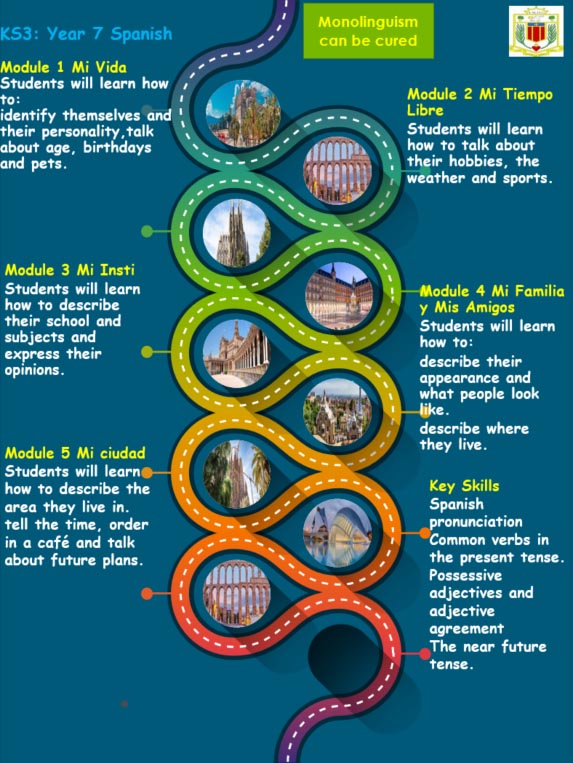
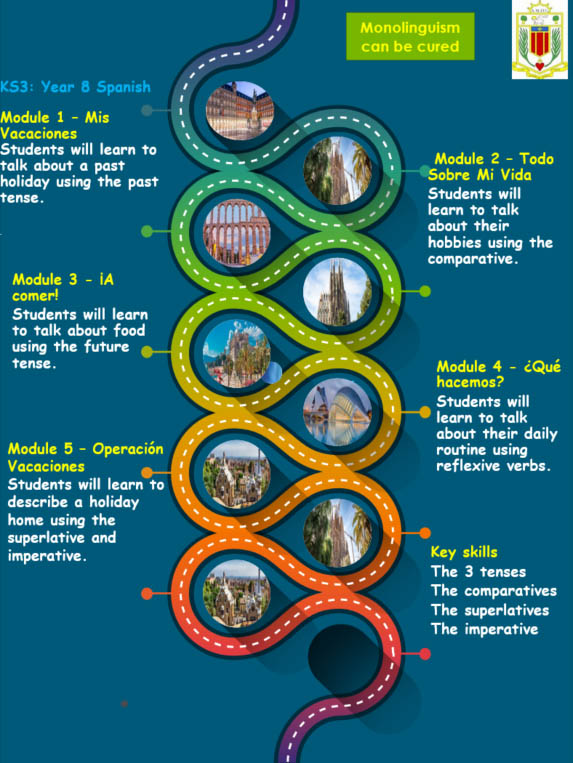
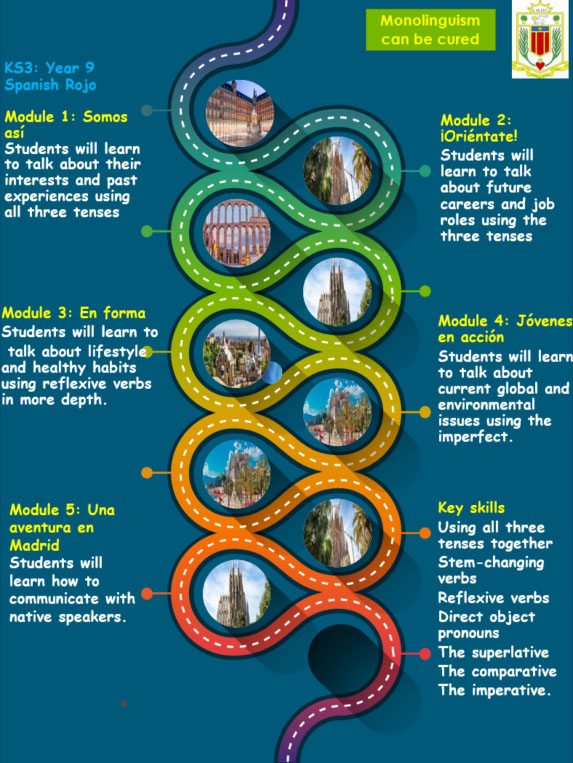
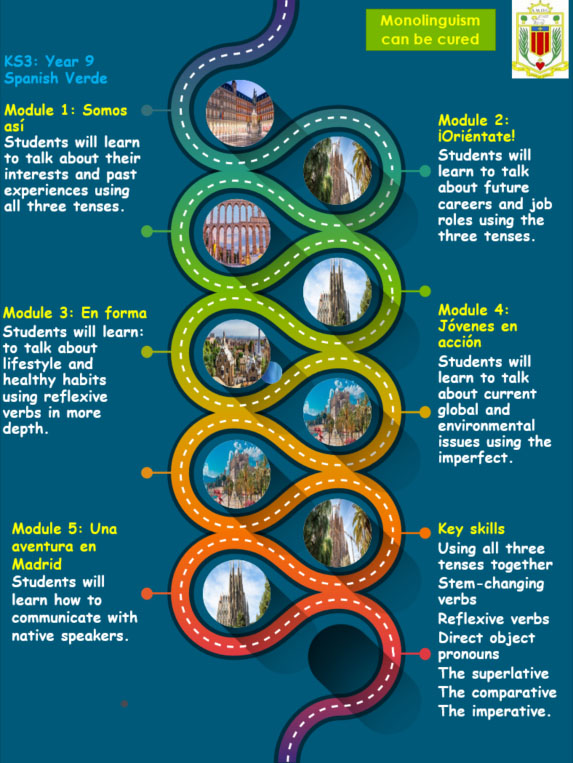
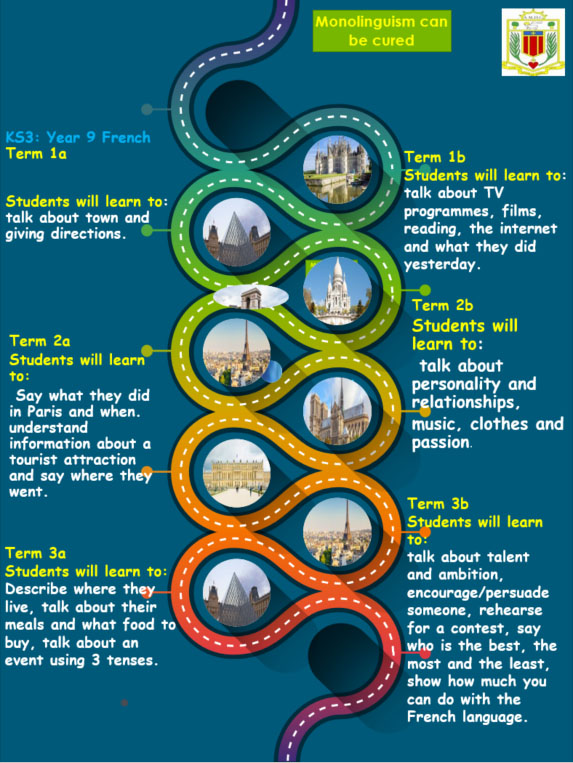
 In today's increasingly interconnected and interdependent world, proficiency in other languages is a vital skill that gives you the opportunity to engage with the world in a more immediate and meaningful way while better preparing you to compete and succeed in the global economy.
In today's increasingly interconnected and interdependent world, proficiency in other languages is a vital skill that gives you the opportunity to engage with the world in a more immediate and meaningful way while better preparing you to compete and succeed in the global economy.